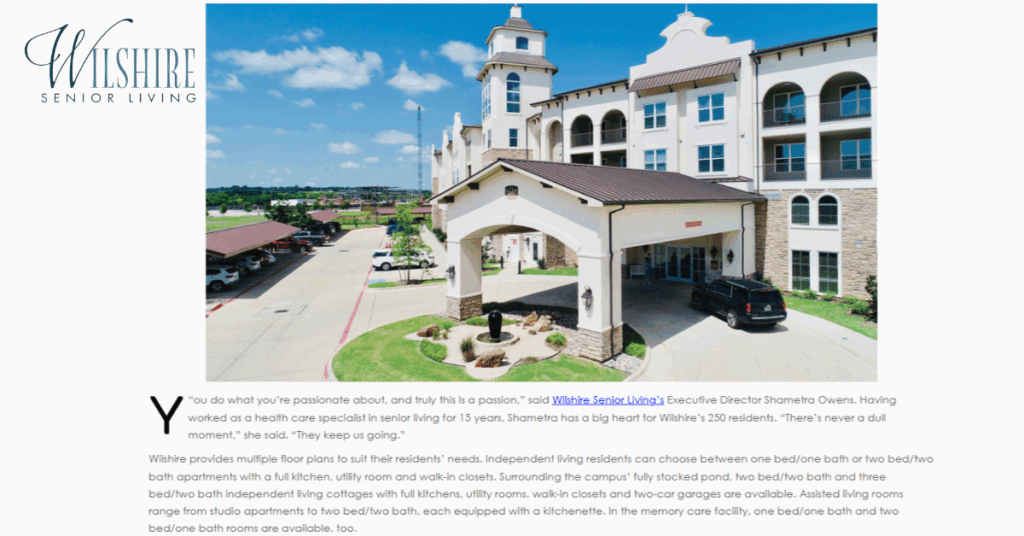We’re thrilled to share that Wilshire Senior Living was featured in Now Magazine! The article shines a light on the heart and soul of our community - our residents, our...
Read more
The Power of Music Therapy for Dementia

Dementia is a progressive neurological condition that affects seniors’ memory, cognitive function and behavior. This health issue makes it increasingly difficult for individuals to communicate with others and engage with the world around them. While there is no known cure for dementia, there are promising non-pharmacological interventions that have shown remarkable benefits. Music therapy for dementia has been scientifically proven to improve the quality of life for those affected. Explore the groundbreaking practice of using music therapy for dementia. Discover music therapy’s benefits and how you can use music to connect with your loved one.
What is Music Therapy for Dementia Care?
Music therapy for dementia is an evidence-based approach that uses music to support cognitive, emotional and social well-being. Through personalized music sessions, trained therapists help individuals with dementia engage, express their emotions, and form meaningful connections.
Music therapy activities for seniors with dementia can include singing, listening to favorite songs, playing musical instruments, and even engaging in rhythmic movement. This may have you wondering, “Why is music therapy good for dementia?” Researchers have discovered that the structured use of music unlocks seniors’ preserved cognitive abilities, allowing them to bypass the communication barriers constructed by dementia.
Fascinatingly, because music is processed in multiple areas of the brain, it remains accessible even in advanced stages of dementia.
Why is Music Important for People Living with Dementia?
Research suggests that music-related experiences like listening, dancing or playing instruments are stored in a distinct part of the brain. This region is thought to be separate from where typical memories are stored. Interestingly, these musical memory areas are often less affected by the cognitive decline of dementia than other areas in the brain. As a result, seniors with dementia are more likely to recall musical memories than conventional memories. This means the benefits of music therapy for dementia can potentially provide significant positive impacts. By unearthing these remaining musical memories, music therapy can affect seniors in various ways that can benefit cognition and mental health.
Benefits of Music Therapy for People with Dementia
Music therapy for dementia has been widely researched, with countless studies demonstrating its positive impact on individuals living with the condition. Explore some of the key benefits of music therapy for dementia to enhance your loved one’s quality of life.
Improves Mood and Reduces Anxiety
One of the most instantaneous benefits of music therapy for dementia is its rapid ability to improve seniors’ moods and reduce anxiety. Enjoying familiar music triggers the release of the “happy hormone” dopamine. This “feel-good” neurotransmitter boosts the mood and helps alleviate feelings of depression, agitation and distress.
Enhances Memory Recall
Another benefit of music therapy for dementia is enhanced memory recall, which has been shown even in severe cases. Playing familiar songs from a senior’s past can trigger cherished memories or positive emotions that allow them to reconnect with their history and remember their loved ones.
Encourages Social Interaction
Seniors with dementia often face social withdrawal, but music therapy for dementia encourages engagement and interaction with peers. Group music therapy offers an interactive opportunity for seniors to sing together, move to the rhythm or even play musical instruments. This exciting therapy fosters a sense of community and inclusion for everyone involved.
Supports Cognitive Function
Although dementia progressively affects cognitive abilities, this progression can be slowed. Music therapy has been shown to stimulate the brain of those with dementia and slow cognitive decline. Musical activities like singing along to song lyrics or following rhythmic patterns require seniors to concentrate, providing mental exercise and increasing their coordination.
Reduces Agitation and Enhances Relaxation
Many individuals with dementia experience negative feelings like agitation, restlessness or even aggression as cognitive decline progresses. Music therapy for dementia has a calming effect on seniors and helps soothe agitation and promote relaxation. Studies show that slow, gentle music can be particularly effective in reducing stress and improving sleep quality for seniors with dementia.

How to Use Music Therapy to Connect with Your Loved One
Incorporating music therapy into your loved one’s daily routine can be a powerful way to connect with them and enhance their quality of life. Explore general tips to help you both make the most of music therapy for dementia care:
- Choose Familiar and Meaningful Music. Selecting music that holds personal significance to your loved one is the key to an impactful music therapy session. Choosing beloved songs from their youth, wedding or cultural background can evoke strong emotions and happy memories. Consider making a personal playlist of their favorite songs and playing them during quiet moments.
- Encourage Singing Along. Singing along to familiar tunes is an excellent way to engage a person with dementia. Even if they struggle to speak, they may be able to remember and sing their favorite song lyrics. Singing also helps with breathing control and enhances your loved one’s mood.
- Use Music to Create a Routine. Practice incorporating music therapy into your loved one’s daily routines to make activities more enjoyable. Play soft, calming music during meals or before bedtime to signal it’s time to relax or use upbeat music to energize morning activities.
- Engage in Gentle Movement. Encourage accessible movement while listening to music, like clapping, tapping feet or swaying. Simple movement helps with coordination, circulation and the overall well-being of seniors with dementia. If your loved one is able to dance with you, it can be a joyful and bonding experience for both of you.
- Observe and Adapt to Their Response. Each person with dementia is unique and responds to music differently. Pay attention to your loved one’s reactions. If they show signs of distress or discomfort, switch to a different song or adjust the volume. Let your loved one’s emotions guide the session for positive results.
- Use Music as a Communication Tool. For those in later stages of dementia who struggle with verbal communication, music can serve as a powerful way to connect. A familiar melody may evoke smiles, eye contact or even simple gestures that provide a precious moment of connection.
- Involve Family and Care Partners. Music therapy can be shared with the whole family. Encourage family members and care partners to participate in music therapy sessions to make your loved one feel valued. Singing together or playing simple instruments can create meaningful memories and strengthen relationships.
Dementia Care with Music at the Wilshire
Music therapy for dementia has been shown to have countless benefits for seniors with cognitive decline. By incorporating music into daily care routines, care partners and family members can improve the emotional well-being, cognitive functioning and social interactions of their loved ones with dementia. This non-pharmacological approach can be personalized and adapted to fit each individual’s specific needs.
The Wilshire Senior Living community understands that music is an essential component of dementia care. By mindfully incorporating music therapy into our residents’ care plans, we help them connect with their past, reduce anxiety and create meaningful interactions that brighten their everyday lives. Contact us today to learn more about our memory care programs and how we use innovative music therapy to support individuals with dementia.
Related Posts
Creating a great memory care environment isn't just about meeting physical caretaking needs. Providing an enriching environment for seniors with memory challenges is an essential part of comprehensive care. Memory...
Read moreWhen a loved one is living with dementia, every day has its own unique rhythm. Oftentimes, the most challenging moments of the day for seniors with dementia can begin as...
Read moreRelated Posts
We’re thrilled to share that Wilshire Senior Living was featured in Now Magazine! The article shines a light on the heart and soul of our community - our residents, our...
Read moreCreating a great memory care environment isn't just about meeting physical caretaking needs. Providing an enriching environment for seniors with memory challenges is an essential part of comprehensive care. Memory...
Read moreWhen a loved one is living with dementia, every day has its own unique rhythm. Oftentimes, the most challenging moments of the day for seniors with dementia can begin as...
Read more



